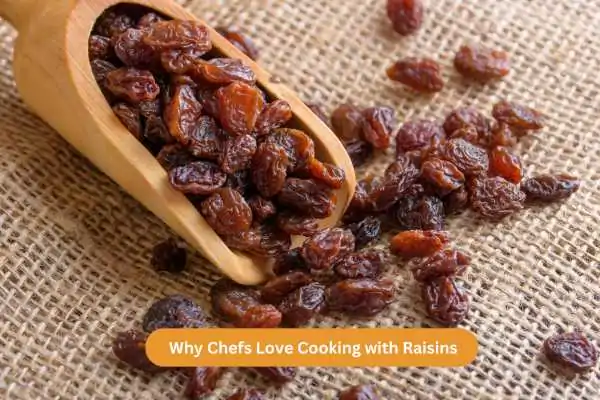Raisins may appear humble, but to professional chefs, they are a powerful and versatile ingredient that elevates both sweet and savoury dishes. Their naturally sweet, tangy flavour, chewy texture, and ability to enhance depth and complexity make them a staple in kitchens around the world—including right here in the UK.

From traditional British puddings to Moroccan tagines and modern European cuisine, raisins offer an unexpected twist that turns ordinary meals into culinary delights. In this article, we explore why chefs love cooking with raisins and how this small dried fruit brings big results in professional kitchens.
A Natural Flavour Enhancer
One of the top reasons chefs reach for raisins is their ability to act as a natural sweetener. Their concentrated sugar content adds sweetness without the need for refined sugar, making them ideal for both desserts and balanced savoury dishes. Whether folded into a lamb stew or scattered over a vibrant salad, raisins offer a pop of flavour that complements spices, herbs, and meats beautifully.
Raisins also contribute subtle acidity and umami, two elements that bring balance to complex recipes. This makes them an invaluable component when chefs are aiming for layered, well-rounded flavours.
Versatility in the Kitchen
Raisins can be used in countless ways, adapting easily to various cooking styles and cuisines. Chefs appreciate this adaptability and frequently use raisins in:
-
Baking – Classic scones, teacakes, fruit loaves, and hot cross buns often rely on raisins for both flavour and moisture.
-
Savoury Dishes – Raisins work well in stuffing, couscous, pilafs, and meat dishes, especially when combined with warming spices like cinnamon or cumin.
-
Sauces and Chutneys – In British and Indian-inspired sauces, raisins add body and a touch of sweetness that balances spice and acidity.
-
Salads and Bowls – Their chewy texture offers a contrast to crisp greens, grains, and nuts.
Their shelf-stability and ease of preparation also make them a convenient choice for busy restaurant kitchens and home cooks alike.
Cultural and Global Appeal
Chefs who love to fuse different culinary traditions find raisins especially useful. This dried fruit has deep roots in Middle Eastern, Mediterranean, Indian, and British cuisines, giving it universal appeal.
In Moroccan tagines, raisins are often paired with lamb and apricots for a rich, aromatic dish. In Indian biryanis and kormas, they balance spicy and savoury notes. In traditional UK recipes, from mince pies to spotted dick, raisins provide that familiar comfort of home-cooked meals.
This cross-cultural presence allows chefs to use raisins as a bridge between culinary worlds, introducing depth and nostalgia into contemporary dishes.
Texture and Visual Appeal
Beyond taste, chefs appreciate how raisins contribute to a dish’s texture and visual interest. When plumped up during cooking, raisins add bursts of juiciness. In baked goods, they provide chewy contrast, while in sauces and grain dishes, they soften to create a melt-in-the-mouth element.
Their rich golden or deep purple hues can also brighten the appearance of otherwise monotone dishes. A scattering of raisins can make a salad look more inviting, or a stew feel more luxurious.
Nutritional Benefits
In today’s health-conscious world, many chefs aim to create dishes that are not only flavourful but also nutritious. Raisins fit naturally into this approach. They are:
-
Rich in natural sugars and energy
-
High in dietary fibre
-
A source of iron, potassium, and antioxidants
Using raisins as a natural sweetener or flavour enhancer helps reduce reliance on artificial ingredients or added sugars—an appealing feature for restaurants looking to offer cleaner, more wholesome menu options.
Minimal Waste, Maximum Impact
In professional kitchens where reducing food waste is crucial, ingredients that are shelf-stable and long-lasting are invaluable. Raisins can be stored for months without refrigeration, do not spoil easily, and have minimal prep requirements.
Their long shelf life means chefs can order in bulk and use them as needed, reducing waste and improving kitchen efficiency. A handful of raisins can transform a dish without requiring major changes to cost or workflow, making them a smart choice in both high-end restaurants and casual cafés.
Raisins in Modern British Cuisine
UK chefs are increasingly integrating raisins into modern British fare. Whether it’s a twist on a pork and apple roast with spiced raisin jus or a plant-based grain bowl with raisins, nuts, and herbs, this humble dried fruit is enjoying a contemporary revival.
Even street food vendors and pop-up kitchens are getting creative—adding raisins to chutneys, sandwich spreads, and fusion tacos. Their affordability and broad appeal make them a flexible ingredient for any chef working in the dynamic UK food scene.
Final Thoughts
Raisins may not be the flashiest ingredient, but they’ve earned a well-deserved place in the professional kitchen. Chefs love cooking with raisins because of their versatility, depth of flavour, texture, and cultural adaptability. From traditional dishes to inventive modern cuisine, raisins add something special that enhances the overall dining experience.
For chefs and home cooks alike, embracing this time-honoured ingredient can lead to endless culinary possibilities—proof that sometimes, the simplest ingredients make the biggest impact.

